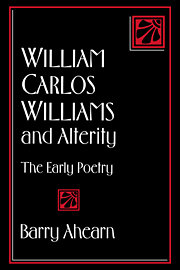5 - Metaphor, Metamorphosis
Published online by Cambridge University Press: 05 January 2012
Summary
In “Education by Poetry,” Robert Frost emphasized the importance of metaphor in intellectual operations and suggested that poetry can teach us how to handle metaphor. Frost believed that an education by poetry laid bare the characteristic patterns of the working intellect. Williams too was preoccupied with metaphoric structure. And like Frost, he believed it was central to the process of thought. But unlike Frost, he questioned traditional handling of metaphor. In Williams's hands, metaphor became another manifestation of his perpetual urge for change and his equally powerful need to remain stable.
We can begin our study of Williams and metaphor with a series of poems that demonstrate Williams's interest in the process of making metaphors. “The Cold Night” (CP1, 154) originated in his professional duties. He had been called to preside over the delivery of a new baby from the body of “the Police Sergeant's wife” (l. 4). The poem begins with the simple assertion that “It is cold,” a statement repeated in line 9. More repetitions follow. Williams repeats “thighs” (ll. 3, 14) and mentions “the Police Sergeant's wife” (l. 15) once more. This verbal doubling complements a visual doubling: the opening simile makes a comparison between a cosmic configuration and a terrestrial grouping – the mother and her five children. This metaphor is suggestive of a primitive, perhaps folk perspective – the earth and sky mirroring each other.
- Type
- Chapter
- Information
- William Carlos Williams and AlterityThe Early Poetry, pp. 99 - 134Publisher: Cambridge University PressPrint publication year: 1994



